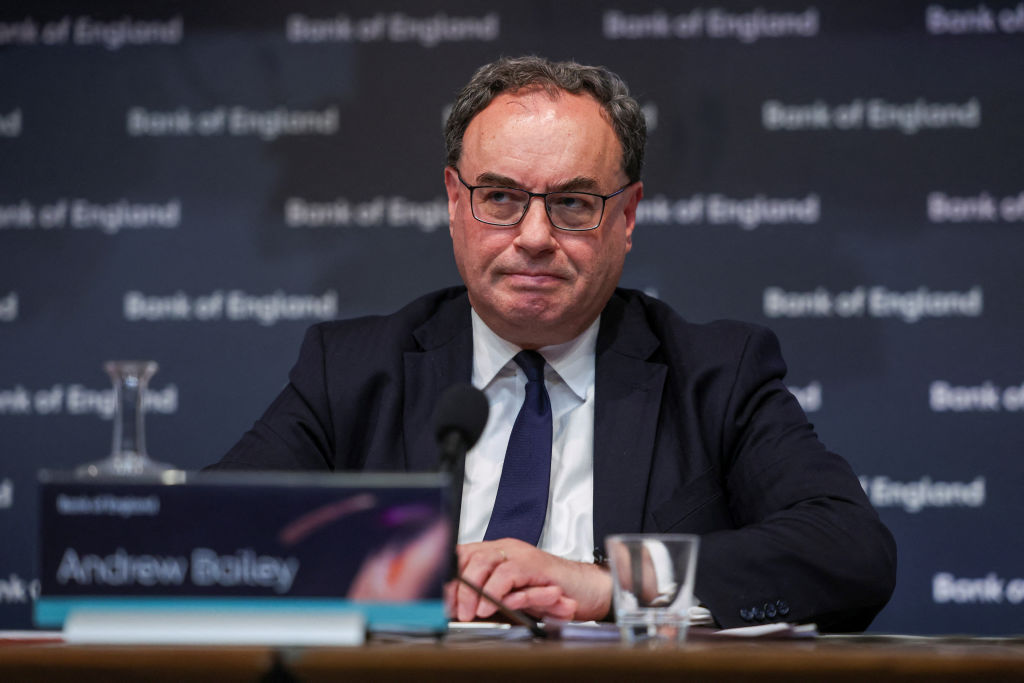After a bruising week, perhaps Andrew Bailey could take some solace in Rishi Sunak’s interview with Laura Kuenssberg this weekend. For a start, the Prime Minister threw his support behind the Bank of England governor, after senior figures within the Conservative party accused Bailey of being ‘asleep at the wheel’. But it was also a reminder that, no matter how bad things may seem at Threadneedle Street, they’re probably worse in No. 10.
When Bailey hits out at wages, it looks like another desperate attempt to deflect blame away from his own institution
Sunak is facing demands for proof that his plan for our economic recovery will work at a time when government debt as a proportion of GDP has reached its highest level since 1961, taxes are going up, productivity down, and growth remains stagnant. Insofar as this administration can control inflation, Sunak has said he is prepared to take unpopular steps on public sector pay. But this is hard to reconcile with reports today that junior doctors may be offered a 6 per cent pay increase and an extra payment of around £1,000 (although Sunak has hinted that he may block these rises).
Data last Wednesday revealed the headline rate of inflation remains at 8.7 per cent, unchanged from the previous month’s figure. Core inflation – which strips out more volatile prices like energy and food – isn’t just ‘sticky’, it has gone up. The CPI services rate also increased, from 6.9 to 7.4 per cent. One former IMF official has warned the UK has the ‘biggest risk’ of a wage-price spiral. Last week, Bailey suggested that pay ‘cannot continue’ going up at its current pace if inflation is to fall.
Are they right?
Average weekly earnings are up 18.7 per cent since February 2020. Wages excluding bonuses are rising at an annual clip of about 7 per cent. Yet as the governor will well know, this is below the inflation rate: in real terms, wages decreased around 2 per cent on the year. We have a very tight labour market, but this is starting to cool: vacancy numbers fell on the quarter for the eleventh consecutive period in March to May 2023.
Despite the frequent comparisons, this is not the 1970s. We are unlikely to experience repeated oil price shocks, or wage increases of 29 per cent. We don’t have a highly unionised, heavy industry based economy any more. This means a doom-spiral – of higher wages leading to higher prices, in turn sparking pay rises, and higher prices – is improbable.
Given inflation in the US and the eurozone are now just 4 per cent and 6.1 per cent respectively, it is not unreasonable for analysts to warn that Britain is at greatest ‘risk’ of a spiral. But for Bailey to hit out at wages looks like another desperate attempt to deflect blame away from his own institution, whose responsibility it is to maintain price stability. Over the course of the past 18 months the Governor has not only warned workers against making pay demands, but hit out at companies for their pricing structures and the over-50s for retiring early. The Bank’s Chief Economist Huw Pill has said we should accept being poorer, while Deputy Governor Ben Broadbent has peddled the tiresome line that the BoE couldn’t have done anything about inflation even if it had raised interest rates sooner.
Warning against central bank independence back in 1972, two economists suggested it would incentivise officials to pursue their own ‘prestige and self-preservation’. Perhaps this is why some members of the MPC are reluctant to concede that our stubbornly high inflation is a direct consequence of loose monetary policy, which was then compounded by the war in Ukraine. In the early months of 2021, the annual growth of the broad money supply exceeded 15 per cent. The Bank appeared oblivious to the dangers, was too slow to react, and only began raising rates in December of that year.
Confidence in the Bank has sunk to new lows. The MPC was forced to raise rates last Thursday by an unexpected half a point to demonstrate that it is serious about getting inflation back down – along with signalling that further rate rises could be on the way. The concern for Sunak must now be that, along with failing to halve inflation by the end of the year as promised, he may not deliver on economic growth. There is widespread concern that the 0.5 percentage point increase in the Bank rate is overkill, and will tip Britain into recession.
Bailey needs a longer-term plan to re-establish the Old Lady’s reputation. The MPC needs more cognitive diversity: its members don’t ‘reflect the society they serve’ any more than Whitehall bureaucrats or staff at the BBC. And the British public deserves a full explanation about how inflation got out of control – one that doesn’t involve blaming workers for, quite reasonably, asking for the biggest pay rises they could get.






Comments